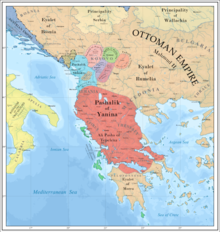Koca Recep Pasha
Koca Recep Pasha | |
|---|---|
| Koxha Rexhep Pashë Palloshi | |
| Pasha of Kalkandelen | |
| Personal details | |
| Born | 1759 Kalkandelen, Sanjak of Prizren, Ottoman Empire |
| Died | 1839 (aged 79-80) Morea, Morea Eyalet, Ottoman Empire[1] |
| Resting place | Arabati Baba Teḱe, Kalkandelen |
| Children |
|
| Relatives | Mehmet Akif Pasha (descendant) |
Koca Recep Pasha (Albanian: Koxha Rexhep Pashë Palloshi) also known as Koca Recep Pasha Kalkandeleni was an Albanian ruler who served as Ottoman pasha of the Pashalik of Kalkandelen.
Origin[edit]
Recep is described as descending from Gjergj Bibaj, leader of the Shala tribe from Shkoder.[2] After a conflict within Shkoder, Gjergj retreated to a Kulla in Luma. There he made friends with the leader of the Kolosije tribe and married his daughter. As a result, he converted to Islam and took the name Dervish.[2] He settled in the Bicaj neighborhood of Luma, and raised a family of three boys. His grandson through his eldest son Hasan, would become Lumali Recep Pasha and settle in Kalkandelen (modern-day Tetovo). Lumali once served as a vali in Thessaloniki[1] and was killed on the front of Iran.
Pashalik of Kalkandelen[edit]

While in Kalkandelen, and after the beginning of the decline of the Bushatli's Pashalik of Scutari, Recep would make regional reforms and expand his influence. He showed very good leadership skills by expanding his territory. Koca Recep, from the beginning of his administration, was committed to the territorial expansion of his domain. In order to include Gostivar, Koca Recep, sent his army under the command of Islam Aga Pipunca and defeated Delibaş Topal Bey, taking full control of the Polog region.[3] He expanded further and administered the region of Kalkandelen, Üsküb and Kyustendil.[2] He would be given the title of mirmiran and establish the Pashalik of Kalkandelen.[3]
Recep Pasha made an extraordinary contribution to the construction of many religious and protective buildings in Kalkandelen. The most important monuments in Tetovo are the works or initiatives of Recep Pasha. He is known as the main initiator for the construction of the Bektashi complex Arabati Baba Teḱe, as well as the construction of the Baltepe Fortress.[3]
The Church of Saint Athanasius in Lešok was also rebuilt. Currently, the portrait of Recep Pasha and his son Abdurrahman Pasha can be found in the Monastery.[2]
Legacy[edit]
Recep Pasha allocated a part of his wealth for humanitarian purposes. During his reign of Pashalik, inns, bridges, bakeries, workshops for the production of tobacco, taps and fountains of the city were built. His sons would rule over different Kazas of region; Abdurrahman Pasha of Kalkandelen, Havzi Pasha of Üsküb[1] and Hasan Pasha of Kyustendil.
References[edit]
- ^ a b c Frasheri, Sami. "Vepra 9" [9]. Vepra: Viset shqiptare në kâmûs al-a'lâm (in Albanian). p. 26.
- ^ a b c d Abazi, Luljeta (2024). "Rexhep Pasha" (in alb).
{{cite web}}: CS1 maint: unrecognized language (link) - ^ a b c Vishko, Dr Ali (2024). "Koxha Rexhep Pasha / Коџа Реџеп Паша" (in alb).
{{cite web}}: CS1 maint: unrecognized language (link)
